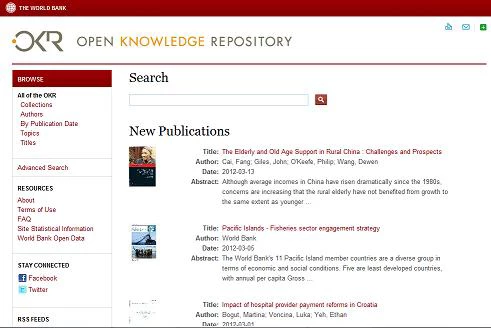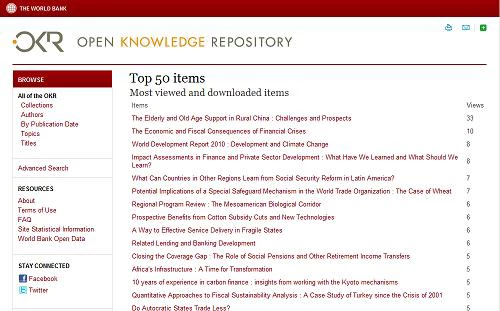Today's launch of the World Bank's Open Knowledge Repository (OKR) and Open Access Policy might not seem a big deal. But it is.
The knowledge bank’s assets are huge, but until today were hard to access
The Bank is a huge producer of knowledge on development. This knowledge surfaces in formal publications of the Bank – the institution publishes books and flagship reports like the World Development Report. It also surfaces in publications of external publishers, including journal articles – up to now, these external publications haven't been seen by the Bank as part of its knowledge output despite the fact they dwarf the Bank's own publications in volume and in citations. The Bank's knowledge also surfaces in reports, and in informal "knowledge products" like briefing notes and other web content.
The OKR is an important step forward in terms of access to internal and external publications, as well as to Bank reports – it will bring big benefits to both users and producers of World Bank knowledge.
Up to now, finding internal and external Bank publications has been a rather hit-and-miss affair. Even people who know their way around the Bank's website aren't always sure where to go to browse, search for, and access the Bank's own publications. And until today, there's been no place online or offline where people could go to browse, search for, and access external publications like journal articles.
Visibility
All this will change as from today. Over time, the OKR (see screenshot below) will include the "metadata" (title, author, date, abstract, etc.) and access information for as many publications authored by Bank staff as possible, whether published by the Bank itself or by another publisher, whether as a journal article, book, or book chapter. It will take time to fully stock the OKR, but even today users have access to the bulk of publications from the last two years. The rest of the treasure trove will follow, including the thousands of journal articles published by Bank staff that Martin Ravallion and I unearthed in our study (1,000 are in the OKR already).
Increased visibility will help users find Bank publications. But it will also help Bank authors disseminate their work, including within the institution – right now Bank staff often know little about one another's external publications, thereby reducing potential impact.
Freedom to use
The Bank has always provided free access to some of its knowledge. Working papers presenting research, for example, have always been free of charge. It has also come a long way in providing free access to publications that it used to charge for. Some 2,600 Bank books are available for free through Google Books, and through other electronic channels such as ISSUU and Scribd (in 2011, Bank books were read nearly two million times on ISSUU and Scribd). The World Development Report is available online, and since 2012 via an iPad app.
The launch of the OKR coincides with the launch of the Bank's new Open Access Policy. This will require all Bank-authored publications to be freely available in time. Given the recent trend towards open access of Bank publications, the category where this policy will "bite" most is externally published content like journal articles and book chapters.
Until now, access to externally published journal articles depended on the user's institution's journal subscriptions. Readers in large universities in the OECD countries probably mostly got free access to most Bank-authored journal articles. But most readers in small and developing-country institutions will not have had free or very affordable access. True they had access to the working paper version of the journal article, and true they could always write to the author for a reprint. But this meant settling for the penultimate version of the paper, or tracking down the author to get the journal article reprint.
Under the Open Access Policy, Bank staff publishing with external publishers will deposit their final (accepted) manuscript in the OKR in word-processed form upon acceptance by the editor/publisher. In due course, this document will be available for free to the public via the OKR. The lag between deposit and free access will vary from journal to journal. The Bank is negotiating terms with publishers, acknowledging that publishers need revenues to cover their costs, but pushing hard to ensure as rapid access as possible. The lags for the Journal of Development Economics, World Development and The Lancet are currently 36, 24 and 12 months respectively.
Over time the embargo period will likely shorten. The last few years have seen the launch of multiple open-access and non-commercial journals, in part as a result of concerns among the research community over prohibitive terms dictated by journal publishers to libraries and the access implications for their research. Funders too have been putting pressure on commercial publishers, in some cases dictating a policy of immediate access from Day 1. Over the next few years, the scientific publishing market seems set for some interesting changes – more affordable access to knowledge seems inevitable.
Freedom to reuse
The Bank's new Open Access Policy also commits the institution to allowing its publications to be freely reused, even for commercial purposes in the case of Bank-published books. Starting today, university and college professors can include as much of a Bank book as they want in a course pack without paying copyright fees or requiring written permission. Once the embargo period has ended, they'll be able to include the word-processed version of a journal article as well. A publisher in, say, Francophone Africa can – as from today – translate and sell a French version of a Bank book without signing a license agreement with the Bank. Publishers are free to include a chapter from a Bank book in an edited volume, and sell it at a profit.
In each case, the author of the original content has to be acknowledged, of course – the translated book, for example, has to be sold as a translated book by the author. But this highly unrestrictive license will considerably help Bank authors disseminate their work, while ensuring they get the credit for it and the reused version is faithful to the original. In opting for the least restrictive license possible the Bank is blazing a trail – it's not just unlocking its treasure trove, it's encouraging people to use its contents as widely as possible.
Easier navigation through the Bank's treasure trove
Once fully populated – and given the rate of growth of Bank publications – the OKR will be huge. There is of, course, already a search facility. But unless they know what they're looking for, OKR users will still need a way to sift through their search results. Or they might not want to do a search and rely instead on some other way to dig out items to read.
The OKR already incorporates some nice features, and others will be added in due course. Users can already browse by author, pulling out all the publications of that author (during their time at the Bank, of course). They can browse by collection, focusing say on journal articles only. Or the user can look at usage statistics, seeing the most-accessed items (see screenshot below). Classification by topic will likely improve over time, and some additional data may be included (such as citation statistics) depending on feasibility and cost. Over time, users will be able to navigate the treasure trove more quickly, and spot quickly the treasure that glitters most.
All in all, today's a great day for people who want to use and reuse the Bank's huge knowledge trove, as well as for producers of the material in the treasure trove.




Join the Conversation